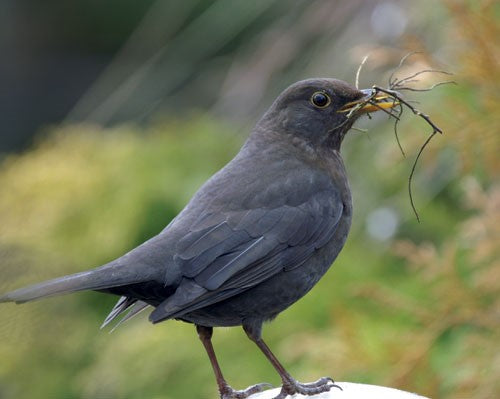
Welcoming the Next Generation: Encouraging Young Birdwatchers
Share
Wednesday, 25th May 2016
As I type this, a female blackbird is outside my window hopping across the ground with what looks like an upturned (and comical) fake moustache in her beak.
It’s not, of course, it’s a piece of nesting material and evidence that the bird’s in the process of crafting a nest for her new family.
After a moment or two, she returns with an empty beak and starts the process again… a piece of straw, numerous small twigs and plant material are gathered with minimal fuss. Stopping briefly for a spot of sunbathing.
The nest building process may take somewhere between ten to fourteen days and it looks like energy sapping, thirsty work. I recall Bill Oddie explaining that healthy Blackbirds may have two or three broods each year and that in a good year - weather permitting - they may even have a fourth brood. The same nest isn’t necessarily used for each successive brood so there’s a lot more nest building ahead for the bird I’m watching today.

Around twenty minutes later, I watched the same Blackbird make her way onto the bird table for a morsel or two of our Golden Chorus. She first tried to feed whilst holding a very long twig in her beak, but soon realised she’d need to put it down so she flew off and headed back into the hedge with her nesting material. A mother’s work is never done, I thought. Then she returned! Empty beak and ready to fill up on some good, clean, fresh feed. Clearly the thought of another bird taking the nesting material was of more concern than her own requirements to take on food. This reminded me why a good quality diet is so important- birds don’t have time to waste, especially during breeding season.
Bill Oddie recently stated that birds need feeding now as they begin to raise their young and he’s right. In his garden, feeders are busiest during June and July. Observing this busy mother I can see that it’s no longer ‘desirable’ to feed our wildlife – it’s crucial to help maintain healthy bird populations. Why? Because our birds continue to face habitat degradation, habitat loss, climate change, pollution and/ or disease. However, our gardens can become a paradise for birds and when combined with other gardens can create a wildlife corridor; a superhighway for animals who appreciate our efforts. Sat here today, though, it’s I who appreciate the efforts of this dedicated mother as she prepares to welcome the next generation of Britain’s beautiful Birds.
Let’s welcome them together with some of Haith’s Finest…
Written by Simon H. King
